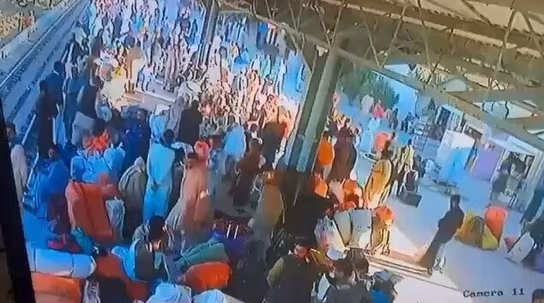Quetta Railway Station Blast: A Tragic Incident Overview
On Saturday morning, Quetta's bustling railway station was tragically struck by a deadly
explosion that claimed the lives of at least 25 people and left 56 others injured. As passengers prepared for the departure of two scheduled trains, including the Jafar Express bound for Peshawar, a suicide blast shattered the station’s ticket booth area, bringing a scene of chaos and devastation to the platform. This incident marks a grave security challenge in Quetta, drawing national and international attention to the city’s long-standing concerns with terrorism.
Immediate Impact and Response
The explosion occurred at a time when a significant number of passengers and railway staff were present. Among the casualties were 14 security personnel, along with railway employees, passengers, and even a woman. The devastating nature of the blast meant that both common citizens and those on duty were caught in its deadly path. Rescue operations were initiated promptly by local authorities, with emergency personnel rushing to the site to evacuate victims. Medical teams at Quetta’s Civil Hospital, as well as trauma centers, were immediately mobilized to handle the large influx of wounded individuals.
With the gravity of the incident, an emergency was declared in hospitals across the area. Medical staff and resources were allocated to meet the urgent demand, ensuring that the injured received timely treatment. Some critical cases were reportedly transferred to the Combined Military Hospital (CMH) in Quetta, a facility better equipped for specialized trauma care.
Details of the Explosion
According to police surgeon Dr. Ayesha, the explosion was indeed a suicide attack. This conclusion was drawn from the positioning and nature of the blast, which targeted the area near the ticket booth where passengers congregated before boarding. Security forces, along with the Crime Scene Unit, arrived promptly to secure the area and conduct a detailed analysis of the attack. Their priority is to investigate how the suicide bomber managed to penetrate the station’s security perimeter.
Security Response and Investigation
The explosion has raised questions regarding a potential security lapse at the railway station, a critical transportation hub in Quetta. SSP (Operations) Muhammad Baloch informed the media that security forces are working to determine the breach that allowed the attack to take place. At the time of the incident, 18 railway police personnel were on duty, though the high density of travelers in the area could have complicated surveillance and security checks.
Quetta Commissioner Hamza Shafqaat confirmed the blast’s nature and urged citizens to exercise caution, as authorities investigate the possibility of further threats. He further emphasized that terrorists tend to target densely populated areas to maximize casualties, and Quetta’s railway station—a bustling center for both travel and commerce—fit this pattern.
Broader Security Concerns and Prevention Measures
The Quetta blast underscores the persistent threat of terrorism in Pakistan, especially in regions like Balochistan, where instability and geopolitical tensions have often created a volatile security landscape. Railway stations, marketplaces, and government offices have historically been frequent targets due to the high volume of daily foot traffic and the often-difficult logistics of maintaining comprehensive security coverage in such spaces.
In response, law enforcement agencies are reassessing their protocols, particularly around transportation hubs. Following the blast, railway authorities closed the station temporarily, allowing the police and security forces to examine the scene thoroughly. Officials are working to implement measures that could prevent similar attacks in the future, possibly by increasing surveillance, deploying more personnel, and upgrading technology at critical points of entry.
National Reactions and Condolences
Prime Minister Shehbaz Sharif and other national leaders condemned the attack, expressing condolences to the victims’ families. Many politicians called for a strengthened response to terrorism, urging both provincial and federal agencies to bolster their resources for tracking and neutralizing extremist elements. The incident has once again united the nation in its resolve against terrorism, sparking renewed discussions about security policies and cooperation between military, police, and intelligence units.
Humanitarian organizations, including the Pakistan Red Crescent Society, are providing support for affected families and coordinating with local hospitals to offer additional aid. Civic groups have also rallied in solidarity, organizing blood donation drives and volunteer efforts to support the victims and their families during this challenging time.
The Path Forward: Strengthening Security in High-Risk Areas
The Quetta railway station blast is a reminder of the challenges Pakistan faces in ensuring public safety amid ongoing threats from extremist groups. The government has vowed to intensify efforts to combat terrorism, with a focus on high-risk locations like railway stations, airports, and crowded public spaces. Advanced security training, more sophisticated detection tools, and tighter inter-agency coordination are among the strategies being discussed to prevent such tragic incidents from occurring in the future.
While immediate measures are critical, long-term strategies also require investments in counterterrorism intelligence, public awareness, and stronger community relations that can assist in identifying and addressing threats before they escalate. The cooperation of citizens in reporting suspicious activities has also become an integral part of maintaining a secure environment, with local authorities stressing the importance of public vigilance and timely communication with law enforcement agencies.
Conclusion
The tragic explosion at Quetta’s railway station has left a profound impact on the nation, highlighting the need for enhanced security measures and a unified response to terrorism. As families mourn the loss of their loved ones, the country stands resilient, determined to address and overcome these security challenges. With heightened precautions and strengthened policies, Pakistan hopes to prevent such tragedies and protect the lives of its citizens, ensuring safer travel and public spaces for all.






